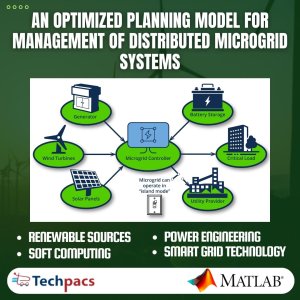Optimizing Home Energy Management: Genetic Algorithm for Effective Load Scheduling and Cost Reduction.
Problem Definition
From the literature survey conducted, it is evident that the current state of Home Energy Management Systems (HEMS) faces several limitations and challenges. One of the key problems identified is the need to reduce electricity costs and Peak-to-Average Ratio (PAR) values through optimization techniques. However, the selection of an ideal optimization algorithm poses a major hurdle for researchers due to the plethora of options available. Existing algorithms often suffer from issues such as slow convergence rates and getting trapped in local minima, leading to increased complexity in the modeling process.
Furthermore, a lack of priority mechanisms in current HEMS results in inefficient device operation, with higher priority devices having to wait for their designated time slots.
Additionally, the impact of erratic weather conditions on load scheduling has not been extensively studied, highlighting a critical gap in the existing research. These limitations underscore the necessity of developing a new and effective HEM system that can address these challenges and provide improved solutions for optimizing electricity usage and managing household energy consumption efficiently.
Objective
The objective is to address the limitations of current Home Energy Management Systems (HEMS) by introducing a new model based on Genetic Algorithm (GA) optimization technique. This research aims to optimize and schedule electrical appliances in a smart home to reduce electricity costs and Peak-to-Average Ratio (PAR) values. Additionally, the model includes a priority mechanism for assigning device operating time slots and considers the impact of erratic weather conditions on load scheduling. By focusing on HVAC, electric water heater, and pump scheduling, the research seeks to analyze cost and PAR values reduction while improving customer comfort. The goal is to develop an efficient HEM system that overcomes existing limitations and provides optimal solutions for managing household energy consumption.
Proposed Work
The proposed work aims to address the existing limitations in Home Energy Management Systems (HEMS) by introducing a new model based on Genetic Algorithm (GA) optimization technique. The main objective of this research is to optimize and schedule the operation of various electrical appliances in a smart home to reduce electricity bills and Peak-to-Average Ratio (PAR) values. The rationale behind choosing the GA algorithm is its high convergence rate and ability to avoid local minima, ensuring optimal solutions are obtained. Additionally, a priority mechanism is introduced to assign operating time slots to devices based on their priority, enhancing the overall efficiency of the system. The impact of erratic weather conditions on load scheduling is also considered to make the proposed HEM system more effective and adaptive.
By focusing on HVAC, electric water heater, and pump scheduling, the research aims to analyze the cost and PAR values reduction while improving customer comfort.
Overall, the proposed work addresses the research gap identified in the literature survey related to optimizing electricity costs and PAR values in HEMS. By leveraging the GA optimization algorithm and introducing a priority mechanism, the new HEM system aims to overcome the limitations of existing systems and enhance their performance. Considering the dynamic nature of weather conditions in load scheduling and prioritizing devices based on importance, the proposed model offers a comprehensive solution to improve energy management efficiency while maintaining customer comfort. The approach of focusing on a few key appliances for analysis allows for a detailed evaluation of the cost and PAR ratio reduction, providing valuable insights for future research and practical implementation in smart homes.
Application Area for Industry
This project can be effectively applied in various industrial sectors that rely on energy management systems to optimize electricity consumption and reduce costs. Industries such as manufacturing plants, data centers, commercial buildings, and healthcare facilities can benefit from the proposed solutions. The challenges of reducing electricity expenses and maintaining a high level of performance can be addressed by implementing the Genetic Algorithm-based load scheduling model. The priority mechanism introduced in the proposed HEMS ensures efficient operation of electrical appliances based on their importance, thus improving overall system functionality. Moreover, considering erratic weather conditions in the optimization process enhances the adaptability and effectiveness of the system.
By utilizing GA's high convergence rate and ability to provide optimal solutions, industries can achieve significant cost savings and enhance the performance of their energy management systems.
Application Area for Academics
The proposed project on optimizing load scheduling in Home Energy Management Systems (HEMS) using Genetic Algorithm (GA) has the potential to enrich academic research, education, and training in several ways. Firstly, it addresses a significant research gap in the field of HEMS by providing a new and effective model for reducing electricity costs and Peak-to-Average Ratio (PAR) values. This can contribute to the existing body of knowledge on smart energy management systems and optimization techniques.
In terms of education, this project can serve as a valuable learning resource for students and researchers interested in the intersection of energy management, optimization algorithms, and smart technologies. By exploring the use of GA in optimizing load scheduling, learners can gain insights into innovative research methods and data analysis techniques within educational settings.
They can also understand how to apply these concepts in real-world scenarios to improve energy efficiency and cost-effectiveness.
Furthermore, the relevance of this project extends to specific technology and research domains related to smart homes, energy management, and optimization algorithms. Researchers, MTech students, and PhD scholars working in these areas can use the code and literature from this project to enhance their own work. They can adapt the proposed model for different electrical appliances, explore the impact of priority mechanisms on load scheduling, and investigate the influence of dynamic weather conditions on HEMS performance.
In terms of future scope, the project can be expanded to include more appliances, integrate renewable energy sources, or incorporate machine learning algorithms for even more advanced optimization.
By building on the foundation laid by this research, future studies can push the boundaries of smart energy management and contribute to sustainable and efficient energy solutions.
Algorithms Used
The proposed work utilizes Genetic Algorithm (GA) for optimizing and scheduling various electrical appliances in a smart home energy management system. GA is chosen for its high convergence rate and ability to provide multiple optimal solutions for a problem. The priority mechanism is introduced among devices to allocate operating time slots based on their priority levels. Additionally, the impact of dynamic weather conditions on the HEM system's performance is considered. The model focuses on scheduling three electrical appliances – HVAC, electric water heater, and pump – to analyze cost reduction and PAR values while maintaining customer comfort.
Keywords
online visibility, SEO, keyword optimization, electricity price reduction, HEMS, optimization techniques, optimization algorithms, local minima, convergence rate, model intricacy, priority mechanism, load scheduling, weather conditions, Genetic Algorithm, load scheduling model, smart home energy management system, electricity bills, PAR ratio, customer comfort, priority mechanism, electrical appliances, dynamic weather conditions, HVAC, electric water heater, pump, cost reduction, energy efficiency, energy consumption, load forecasting, load balancing, demand-side management, renewable energy integration, smart grid, energy conservation, home automation, power scheduling, artificial intelligence
SEO Tags
home energy management, load scheduling, optimization, genetic algorithm, cost-effective operation, energy efficiency, energy consumption, energy management systems, load forecasting, load balancing, smart homes, demand-side management, renewable energy integration, smart grid, energy conservation, home automation, power scheduling, artificial intelligence
| Shipping Cost |
|
No reviews found!

















































No comments found for this product. Be the first to comment!